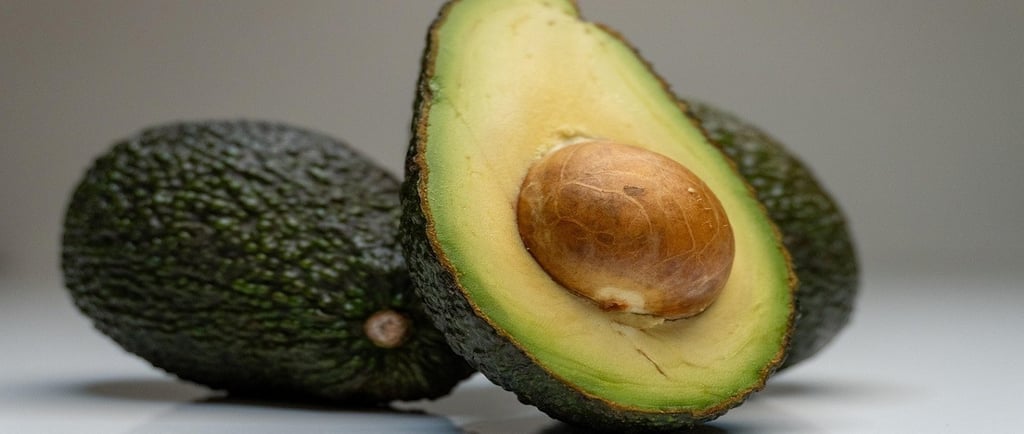Health Benefits of Avocado
Avocado is a nutrient-dense fruit. It is rich in healthy fats and fiber, which can help lower the risk of heart disease and improve digestion. Read this mini blog to learn more!


Avocado is a nutrient powerhouse; it is a kind of berry, also known as alligator pear or butter fruit. Avocado is mainly cultivated in Mexico and Central America.
Avocados contain monounsaturated and polyunsaturated fats that help improve cardiovascular health. It is also a good source of fiber, vitamin E, K, potassium, and magnesium.
Avocado is a calorie-dense fruit. A 100 g of avocado contains around 223 calories and 20.3 g of fat, most of which is oleic acid, a healthy monounsaturated fat. Consuming healthy fats helps you feel fuller for longer and slows down the digestion of carbohydrates, which aids in maintaining stable blood sugar levels.
They are rich in healthy fats, which help in the absorption of fat-soluble vitamins and improve skin health. Avocados contain beta-carotene, an antioxidant that is good for brain, skin, eye, and lung health.
Avocados also contain nutrients like Folate (Vitamin B9), other B-complex vitamins, and copper. These nutrients help prevent several diseases and maintain a healthy body.
Avocados have a low glycemic index of around 15, so it doesn't cause a blood sugar spike.
You can consume avocados raw, use them in salads, mix with yoghurt, spread them on toast, make guacamole, or use them in tacos and burritos.
According to the United States Department of Agriculture (USDA), avocados contain the following macronutrients, vitamins, and minerals.
Pros of Eating Avocados
1. Beta-sitosterol, a plant sterol present in avocados, lowers bad cholesterol (LDL) and improves heart health.
2. Phytochemicals, such as lutein and zeaxanthin, present in avocados act as antioxidants and improve eye health.
3. Avocados contain Vitamin K, which helps with calcium absorption, thereby strengthening bones. Vitamin K also reduces urinary calcium loss
4. Avocados contain folate, which supports fetal health and reduces the risk of depression in adults.
5. Avocados are rich in dietary fiber, which promotes digestion and helps remove toxins from the body.
6. Microbial properties of avocados help prevent infections.
7. Fiber in avocados keeps you fuller for longer, which aids weight management.
8. Avocados can help manage blood sugar and are beneficial for people with type type-2 diabetes.
9. Avocados have nutrients like vitamin E, healthy fats, and antioxidants that help improve brain function.
10. Several vitamins, minerals, and phytochemicals in avocados help reduce inflammation.
11. Avocados are rich in various antioxidants that protect from harmful free radicals and lower the risk of chronic diseases.
12. Avocados help improve skin and hair health.
Cons of Eating Avocados
1. Avocados are calorie-dense and high-fat content fruit; excess consumption can cause weight gain.
2. Avocados contain Vitamin K, which can affect the work of blood thinners like warfarin.
3. Avocado allergy is rare, but it may cause mild itching and swelling in the mouth in some individuals.
4. Excess consumption of Avocados can cause gas, bloating, or diarrhea due to high fiber content.
5. Avocados are a high-potassium fruit. People with kidney issues should limit their consumption.
6. People with latex allergy should avoid consuming avocado as they may experience an allergic reaction.
7. Avocados contain tyramine, an amino acid that causes blood vessels to constrict and expand, which can cause migraines.
Interesting Facts
1. Avocado oil can be used as a sunscreen and can also protect the skin from harmful UV radiation.
2. Avocados have more than 500 varieties worldwide. Hass avocado is the most popular type.
3. Avocados can remain unripe on the tree for 18 months; they only start ripening after being removed from the tree.
4. Avocados have more potassium than bananas.
5. Avocado is the most fat-containing fruit; around 80% of its calories come from healthy fats.
6. Avocados were called " ahuacatl" by ancient Aztecs, which means testicles. They believed avocados to be an aphrodisiac and a symbol of fertility.
7. Mexico is the leading avocado producer in the world.





